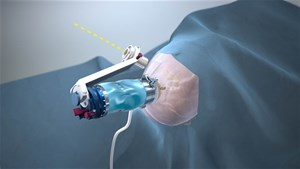Mazor Robotics, a global leader in the development and distribution of innovative surgical guidance systems for spine and brain surgery, announced today the first Deep Brain Stimulation (DBS) surgery performed with its Renaissance® Guidance System to treat patients with Obsessive Compulsive Disorder (OCD).

On February 23, 2015, Dr. David VanSickle of South Denver Neurosurgery was the first physician to utilize the Renaissance Guidance System to successfully perform the DBS procedure to treat OCD on 30-year-old twins at Littleton Adventist Hospital in Littleton, Colorado, part of Centura Health's Neurosciences system of care.
"DBS involves placing implantable neurostimulators (electrodes) in targeted areas of the brain," said Dr. VanSickle. He added, "The key is to place the device precisely inside the brain to minimize brain tissue damage. This is where the Renaissance® Guidance System comes into play. It allows me to increase surgical accuracy and precisely hold the trajectory. It is groundbreaking technology that is great news for patients suffering from this debilitating disease."
After the procedure, all electrodes were verified by intra-operative CT to be placed in the intended location to an accuracy of less than a millimeter.
"This milestone is another testimony to our commitment to improving the art and science of spine and brain surgery, with one main focus: improving patient care," said Ori Hadomi, CEO of Mazor Robotics.
According to the National Institute of Mental Health, OCD affects about 2.3% of the US population aged 18 to 54 years (3.3 million Americans). An additional one million children and adolescents have the disorder. If left untreated, OCD symptoms become progressively worse, making it difficult to function at school, at work, and at home. Treatment is therefore crucial. Initial approaches to OCD treatment include pharmacological, therapeutic, and self-help methods. However, when severe OCD proves resistant to the typical standard of care, physicians may turn to DBS as a surgical option.